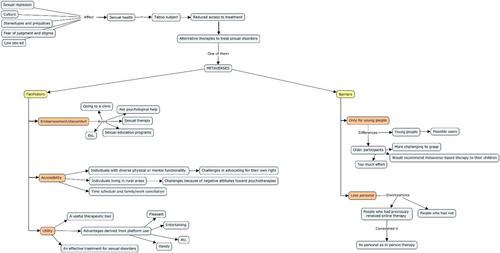Sexual Interventions in the Metaverse: Attitudes Towards Novel Therapeutic Approaches, a Qualitative Study
Abstract
Background and Objective
Mental health treatment for psychosexual problems is effective, but treatment rates are low. Metaverse-based therapy offers one solution to increase overall treatment rates. Understanding attitudes towards this novel approach could lead to wider adoption of metaverse-based therapy, resulting in higher treatment rates for psychosexual problems.
Methods
Twenty-one participants across three focus groups of different ages shared their perceptions and attitudes about metaverse-based therapy broadly and for treating sexual disorders. A content analysis of the transcribed text from the focus groups using qualitative data analysis software was conducted.
Results
Participants identified several perceived benefits of metaverse-based intervention, including avoiding the perceived embarrassment of going to a clinic and accessing patients (a) with diverse physical or mental functionality, (b) living in remote areas and/or (c) balancing different family/work obligations or duties. The two main concerns with metaverse-based therapy were the fear of online therapy being less personal than traditional therapy and the technological fluency needed. Clarifying their acceptance of the therapy, participants reported that they would be more likely to engage in metaverse-based therapy if they trusted their therapist. Also, although it might be effective for mild and moderate disorders, participants were more reluctant about its use for severe mental illness.
Conclusions
Results suggest that attitudes towards metaverse-based intervention are mainly positive, since it removes some barriers that hinder access to psychological treatment in general and, specifically, for problems of a sexual nature.
Patient and Public Contribution
During the design stage, a person with sexual difficulties was consulted to understand the patient's perspective. Members of the public advised the implementation of the focus groups. Three potential service users were involved in the coding of the text during the content analysis.


 求助内容:
求助内容: 应助结果提醒方式:
应助结果提醒方式:


